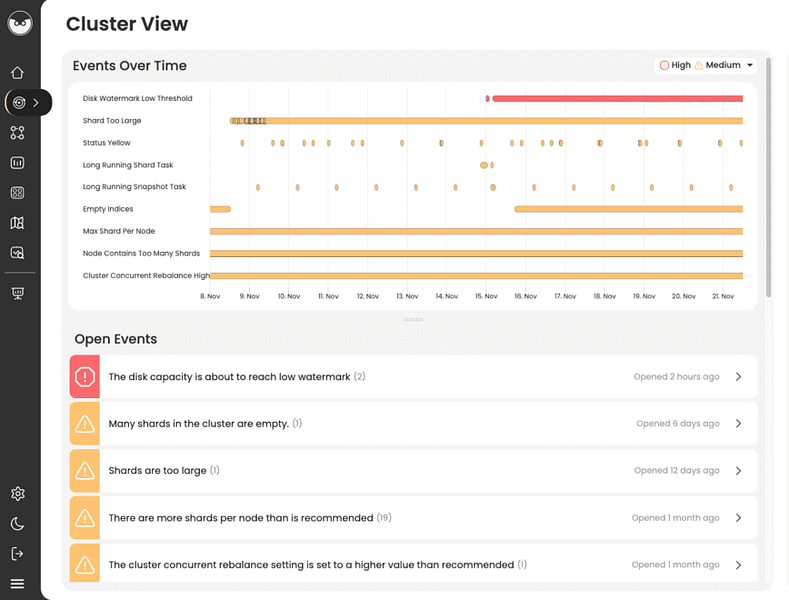Opster Team
Before you begin reading this guide, we recommend you run Elasticsearch Error Check-Up which can resolve issues that cause many errors.
Advanced users might want to skip right to the common problems section in each concept or try running the Check-Up which analyses ES to pinpoint the cause of many errors and provides suitable actionable recommendations how to resolve them (free tool that requires no installation).
Important Note:- This log is for Elasticsearch versions before 7.X. beginning from 7.X Elasticsearch uses a new cluster coordination technique explained in this official ES blog.
Overview
Before Elasticsearch’s current major version(7.X), Elasticsearch used the Zen discovery module for discovery and cluster formation. This module uses two main configs in production, to create a cluster and elect the master nodes.
discovery.zen.ping.unicast.hosts: //list of all the nodes participate in the cluster discovery.zen.minimum_master_nodes: //Minimum no of master nodes in your cluster..
Troubleshooting steps:
- A warning log would mention how many master nodes were found and how many are required, for example, the warning log below shows a total of 2 master nodes required and no master nodes found. The number of total master nodes is dependent on the config discovery.zen.minimum_master_nodes.
not enough master nodes discovered during pinging (found [[]], but needed [2]), pinging again
- Check how many master nodes are configured in your cluster by default., Eevery node can act as the master node, and you can explicitly disable it using node.master : false in the particular node’s elasticsearch.yml.
- The above step helps to determine how many nodes are eligible to become masters, and if this is less than the discovery.zen.minimum_master_nodes, then the cluster won’t able to choose the master node.
- Sometimes due to network issues or some other issue, some eligible master nodes are not connected to other nodes and to troubleshoot this, you can enable the TRACE logging by adding the below line in elasticsearch.yml.
logger.org.elasticsearch.discovery: TRACE
This gives more information on the cause, like in the sample TRACE log below for Zen discovery, which mentions that another master eligible node is not reachable (as it hadn’t been started)., The IP was mentioned in the discovery.zen.ping.unicast.hosts:
[2020-03-20T06:35:00,218][TRACE][o.e.d.z.UnicastZenPing ] [] [10] failed to ping {#zen_unicast_172.31.36.118_0#}{BvhuywOqT1qf5Jxwn5zcsw}{172.31.36.118}{172.31.36.118:9300}
org.elasticsearch.transport.ConnectTransportException: [][172.31.36.118:9300] connect_timeout[3s]Overview
The process known as discovery occurs when an Elasticsearch node starts, restarts or loses contact with the master node for any reason. In those cases, the node needs to contact other nodes in the cluster to find any existing master node or initiate the election of a new master node.
How it works
Upon startup, each node looks for other nodes, firstly by contacting the IP addresses of eligible master nodes held in the previous cluster state. If they are not available, it will look for nodes based upon the seed host provider mechanisms available.
Seed host providers may be defined in 3 ways: list based, file based or plugin based. All of these methods provide a list of IP addresses or hostnames which the node should contact in order to obtain a list of master eligible nodes. The node will contact all of these addresses in turn, until either an active master is found, or failing that, until sufficient nodes can be found to elect a new master node.
Examples
The simplest form is to define a list of seed host providers in elasticsearch.yml:
discovery.seed_hosts: - 192.168.1.10:9300 - 192.168.1.11 - seeds.mydomain.com
An alternative way is to refer to a file using the following setting:
discovery.seed_providers: file
The file MUST be placed in the following filepath: $ES_PATH_CONF/unicast_hosts.txt
10.10.10.5 10.10.10.6:9305 10.10.10.5:10005 # an IPv6 address [2001:0db8:85a3:0000:0000:8a2e:0370:7334]:9301
Note that the use of a port is optional. If not used, then the default port range of 9300-9400 will be used.
If you use AWS or GCS then you can install and use a plugin to obtain a list of seed hosts from an API. A plugin also exists for Azure but is deprecated since version 5.
AWS plugin
A typical configuration could be as follows:
discovery.seed_providers: ec2 discovery.ec2.tag.role: master discovery.ec2.tag.environment: dev discovery.ec2.endpoint: ec2.us-east-1.amazonaws.com cloud.node.auto_attributes: true cluster.routing.allocation.awareness.attributes: aws_availability_zone
The above configuration would look for all nodes with a tag called “environment” set to “dev” and a tag called “role” set to “master”, in the AWS zone us-east-1. The last two lines set up cluster routing allocation awareness based upon aws availability zones. (Not necessary, but nice to have).
GCE plugin
A typical configuration could be as follows:
discovery.seed_providers: gce cloud.gce.project_id: <your-google-project-id> cloud.gce.zone: <your-zone> discovery.gce.tags: <my-tag-name>
The above configuration would look for all virtual machines inside your project, zone and with a tag set to the tag name you provide.
Notes and good things to know
Cluster formation depends on correct setup of the network.host settings in elasticsearch.yml. Make sure that the nodes can reach each other across the network using their IP addresses / hostname, and are not getting blocked due to firewall settings on the ports required.
Log Context
Log “Not enough master nodes discovered during pinging (found [{}]; but needed [{}]); pinging again” classname is ZenDiscovery.java.
We extracted the following from Elasticsearch source code for those seeking an in-depth context :
final ElectMasterService.MasterCandidate winner = electMaster.electMaster(masterCandidates);
logger.trace("candidate {} won election"; winner);
return winner.getNode();
} else {
// if we don't have enough master nodes; we bail; because there are not enough master to elect from
logger.warn("not enough master nodes discovered during pinging (found [{}]; but needed [{}]); pinging again";
masterCandidates; electMaster.minimumMasterNodes());
return null;
}
} else {
assert !activeMasters.contains(localNode) :
Find & fix Elasticsearch problems
Opster AutoOps diagnoses & fixes issues in Elasticsearch based on analyzing hundreds of metrics.
Fix Your Cluster IssuesConnect in under 2 minutes

Jose Rafaelly
Head of System Engineering at Everymundo





